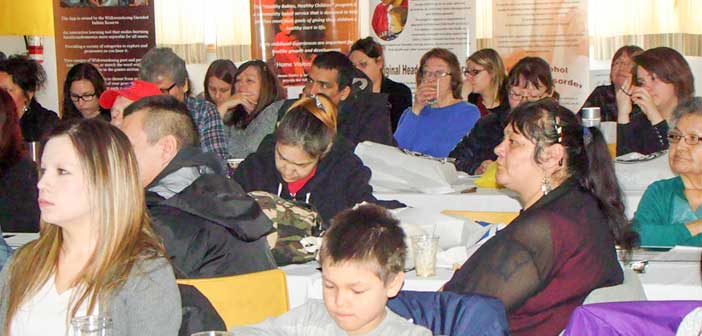by Jean Oshkabewisens
WIKWEMIKONG—Balancing the concept of Western and traditional medicine can be beneficial for aboriginal people who are on their journey of wellness and recovery. The Wikwemikong Health Centre recently held a Wellness Gathering, titled “Celebrating and Achieving Mino Mbaadiziwin (meaning the good health; mind, body and spirit)” at the Wikwemikong Arena recently.
The two keynote speakers were Dr. Annelind Wakegijig, of Wikwemikong, and Dr. Sankey from the Sunrise Clinic of Wikwemikong.
Dr. Wakegijig, who has been a physician for 15 years is a Wikwemikong band member, the eldest of five children and daughter of Rosemary Wakegijig and the late Ronald J. Wakegijig, who was a traditional healer in the Anishnaabe community. She currently practices at the Baawaaging Family Health Team, on the Rankin Reserve, just outside of Sault Ste. Marie.
She received her licence from the College of Physicians and Surgeons of Ontario and the Canadian College of Family Physicians.
“The greatest teacher of all was my dad, Ronnie Wakegijig,” said Dr. Wakegijig, who spent countless hours of studying, receiving formal training and many two-day exams to become a doctor. According to Dr. Wakegijig, one of the differences she sees with western medicine and traditional medicine is that with western medicine there is a lot of formal training, whereas with traditional medicine the learning is less formal and sometimes people are chosen as healers by the Creator and the elders. With traditional medicine, there is a lot of observing and seeing and among traditional healers, there is sense of helping one another to help that individual, she says.
“An absolute dream of mine is to dispense Anishinaabe medicine,” says Dr. Wakegijig. Currently she will give her patients miinigun (plant based salve medication) if they request it for skin irritations. She says she made it herself and when conversing with the patient, she can speak the language and if they prefer to try the miinigun, she will give it to them, she says.
Dr. Wakegijig said one of the saddest things she has seen during her duties as a coroner is when people die alone. “We have to hold our elders tight, we have to embrace our family, you never know what kind of day it’s going to bring you, being a coroner has taught me that.”
In her concluding remarks, Dr. Wakegijig spoke of some of life’s lessons to remember; that “living a good life is the biggest and best gift you can give yourself, you’re honoring your ancestors” and “you never look down on anybody.”
The other keynote speaker was Dr. Christopher Sankey, who works with the Sunrise Clinic in Wikwemikong. He received his medical degree from McMaster University in 1990 and prior to that, he studied philosophy and physics at the University of Toronto. Dr. Sankey has over a decade of experience assisting patients with addiction issues. He has attended national and international scientific symposia on the topic of buprenorphine, methadone and counselling treatments for opioid addiction.
The Wikwemikong Sunrise Clinic provides addiction treatment services for individuals who abuse or become dependent on prescription or street narcotics. According to its brochure, the clinic is based on an opioid replacement treatment program. Their treatment process and services include physician counselling, monitored urine drug testing, electronically controlled prescriptions, addiction counselling, community agency referrals and interaction, laboratory services and court-ordered drug and alcohol testing.
In Dr. Sankey’s opening address, he stated that, “Canada is known as the world capital of opioid abuse.” The over-prescribing of drugs is reaching epidemic proportions and the problem is not just on reserves, the problem is widespread, according to Dr. Sankey. According to the Centre for Addiction and Mental Health (CAMH), the number of people receiving methadone maintenance treatment in Ontario has increased sharply in recent years, from 6,000 in 2000 to 30,000 in 2010.
When the Sunrise Clinic first opened in 2014, there were 91 patients, today there are 88 patients, three patients have since left the clinic, said Dr. Sankey.
“The best money our government can spend, is to fund methadone and suboxone treatment clinics,” said Dr. Sankey.
During the opening remarks by Mary Jo Wabano, Wikwemikong Health Services Director, recognition was provided in the form of Health Award recipients for Wikwemikong students in the health field. Those recipients were: four awards of $250 each to recent graduates Kathleen M. Manitowabi, Nicole Wemigwans, Wahsayskwahn Wabano and Natalie Shawana-Waboose; a $500 award to fourth year student Trisha Trudeau, a $500 award to third year student Jordan Pitawanakwat, a $500 award to second year student Shanna Peltier and a $500 to first year student Sharlene Webkamigad.
Other presentations also included a presentation on “How to Dispose of Used Needles” by Daniel Wassengeso, Wikwemikong Health Centre and band members gave testimonials on how traditional and western medicine has helped them on their healing journeys.
Information booths were also set up throughout the day for band members’ perusal, those participating agencies were; Wikwemikong Health Centre Aboriginal Diabetes Initiative, Children Services Program, Nadmadwin Mental Health Clinic, Ngwaagan Gamig (Rainbow Lodge), Sunrise Clinic, Ontario Works, Band Membership, Cancer Screening, Wikwemikong Anishnaabemowin Program, Daystar, Library, and Waasa Naabin Youth Centre.
There were approximately 148 participants at the Wellness Gathering, followed by a round dance teaching in the afternoon and later in the evening a round dance social was held with approximately 50 to 75 people attending.
The problem of prescription drug abuse is not new to Wikwemikong, in 2005 then Wikwemikong Chief Robert Corbiere had developed a taskforce titled “Caring for Our Youth,” which was created by the leadership to address the problems of drugs, prescription and street-drugs. This also led to the Crime Stoppers program introduction to the community of Wikwemikong. Though the challenges and difficulties may be more visible and prevalent now, the leadership of Wikwemikong is taking steps to address and provide resources for those band members requesting assistance on their road to recovery, Mino M’baadizwin (meaning the good health; mind, body and spirit).




